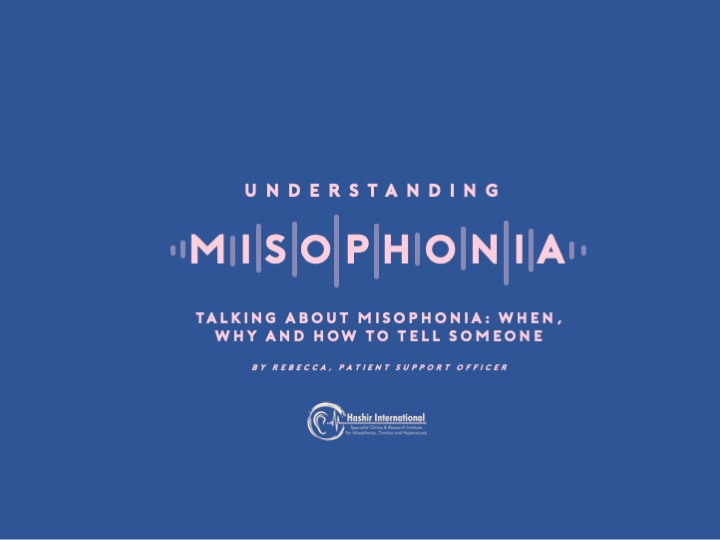
How to talk to friends, family, and colleagues about your misophonia, from my perspective
One of the questions I get asked the most while talking to others with Misophonia is “How do you tell people you have it?”. I completely understand where this question is coming from. When you are in the thick of the disorder it can be isolating and embarrassing. You can hardly reason with it yourself, so how on earth could you explain it to someone else? It can feel like a massive, daunting task to talk about your Misophonia, so I am writing this with the hopes of offering some advice, from my experience talking about it with friends, family, partners and even colleagues.
I have lived with Misophonia for over two decades and it has influenced many elements of my life. Naturally, it has come up in conversation, or needed to be addressed with maybe a dozen people over the years. One of the earliest conversations outside my family happened during high school. I was finding sleepovers with my closest friends impossible. I would dread the moment people decided to sleep, and try to keep the conversation going as long as possible. I knew that as soon as the lights went out, I would become hyper-focused on the sounds of my friends breathing, sniffing, or moving their mouths while they slept. I would try to snag a spot in the room as far from others as possible and noticed my friends looking confused about this choice. I also knew that in a tired blur during the middle of the night, I was more likely to verbally snap when it all got too much. It took one too many sleepless nights, where I hid my tears behind my pillow, to finally feel like I needed to tell a friend. I remember walking home from school with Kirsty, and saying something along the lines of:
“You know when I stay awake for ages at our sleepovers, and I’m really tired in the morning? It’s because I find it really hard to sleep when there are noises, even really quiet ones. I can’t ignore them and usually, I end up staying awake even when I don’t want to.”
In this conversation, I decided that for me, I didn’t want to go into detail about the noises being made by other people or describe other situations where my misophonia happened. I knew that this was the limit of what I was ready to talk about in that moment. We ended up deciding that at lights out, I could sneak down and sleep on the sofa, or in a spare room instead. I remember her being so calm and kind about it, even though we were only eleven and I had imagined all sorts of humiliating questions or gossip. To her it felt like a secret we could keep together, she felt proud I had trusted her, and we became even closer as friends.
Depending on the situation and relationship, I have shared different levels of detail about my Misophonia. For example, I spoke to bosses about loud working environments and at first thought it would be okay to be vague about the reason. However, when I felt they were dismissing the problem and not understanding, I realised I needed to be more specific in describing what Misophonia was, and the level it can impact me.
“I wanted to talk to you again about the noise level in the office because I actually didn’t give you all the information when we first spoke. It is quite personal, but it’s also really important to me that I share this with you so we can figure out a plan. The reason the noise is impacting me so much is actually because of a disorder I have called Misophonia. Basically, it means that certain noises cause me more anxiety or stress than other people – no matter how much I try to ignore them. I want to find a way I can avoid feeling stressed at my job because it’s important to me to do it well, and keep enjoying doing it.”
I also offered some suggestions for changes that were realistic and had a minimal impact on other people’s day-to-day office life. I encouraged them to read about Misophonia themselves so they could understand more – I remember spelling it out for them so they could Google it later! This ended up being a crucial and constructive conversation – If I hadn’t shared my Misophonia with them, nothing would have changed and at worst, they could have thought I lacked focus or motivation. We found a good middle ground that helped me relax at work, and they struck the right balance of being professional about the personal info I had shared, while also checking in during my reviews that the changes had made a difference.
Over the years, conversations I have had about my Misophonia have created a whole spectrum of emotions. Some have been nerve-wracking, awkward and sometimes difficult, but I don’t regret a single one. Eventually, these conversations have reminded me how great a friend is, revealed someone I could reach out to for help or showed me that I had support at work when I needed it. It’s not always easy though, so here are some quick tips that I hope make it a slightly smoother conversation when you decide it’s time to talk.